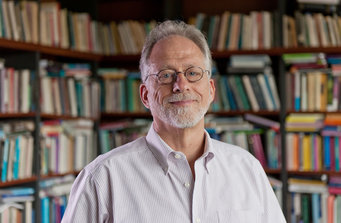Born to cooperate
The Klaus J. Jacobs Research Prize will be presented to Michael Tomasello from the Max Planck Institute for Evolutionary Anthropology in Leipzig on 2 December 2011. The award, which comes with a prize fund of one million Swiss francs (approximately 815,000 euro), honours exceptional research achievements in the area of child and youth development.

Children as young as one, who are still unable to talk, already cooperate with other children and help them. As discovered by Michael Tomasello, they display this behaviour without being influenced by adults. The developmental psychologist studied communication and learning processes in pre-school children and compared it with that of apes. He found that young children only understand space, volumes and logical connections a little better than chimpanzees, for example. However, unlike the apes, “they join forces to solve problems together, communicate cooperatively and can recognise the intentions of others. They are born to cooperate,” says Michael Tomasello. Moreover, the Max Planck scientist firmly believes that the ability to speak developed out of this particularly human characteristic over the course of evolution.
“The Jacobs Foundation (http://www.jacobsfoundation.org) is honouring Michael Tomasello’s groundbreaking research achievements with this award,” explains CEO Bernd Ebersold. “They provide not only new insights into the development of young children, they also create a new awareness of the uniqueness of our human existence.” The award provides the Max Planck scientist with a welcome incentive to carry out further research in his field: “The money enables us to carry out bigger, longer-term research projects which would not otherwise be possible.”
Michael Tomasello is already the recipient of some very prestigious awards. In addition to the Max Planck Research Award, which honours researchers who generate new impetus in a scientific field, receiving the city of Stuttgart’s celebrated Hegel Prize has earned Tomasello particular renown as he was the first scientist to win it. “An excellent choice as this researcher shows how big speculative questions can be dealt with in empirically controllable fields,” was the verdict of the arts section of the Frankfurter Allgemeine Zeitung. The laudation on that occasion was given by none other than Jürgen Habermas.
The Jacobs Foundation presents two awards each year in honour of its founder, the businessman Klaus J. Jacobs who died in 2008. The Klaus J. Jacobs Research Prize honours scientific achievements of a particular social relevance. In making this award, the Foundation attaches particular importance to the practical application of scientific insights from interdisciplinary research. The Klaus J. Jacobs Best Practice Award recognises exceptional commitment on the part of institutions or people who put innovative solutions into practice in the field of child and youth development. Both prizes will be presented this year at a ceremony to be held at the University of Zurich on December 2nd.
BA
************************************************************************
The Jacobs Foundation is involved in the field of child and youth development throughout the world. It was established by businessman Klaus J. Jacobs in 1988 in Zurich. The Jacobs Foundation provides an annual budget of approximately CHF 35 for the support of research projects, intervention programmes and scientific institutions. With its EUR 200 million investment in the Jacobs University Bremen (http://www.jacobs-university.de) (2006), the Jacobs Foundation set new standards in the area of private support and funding.
